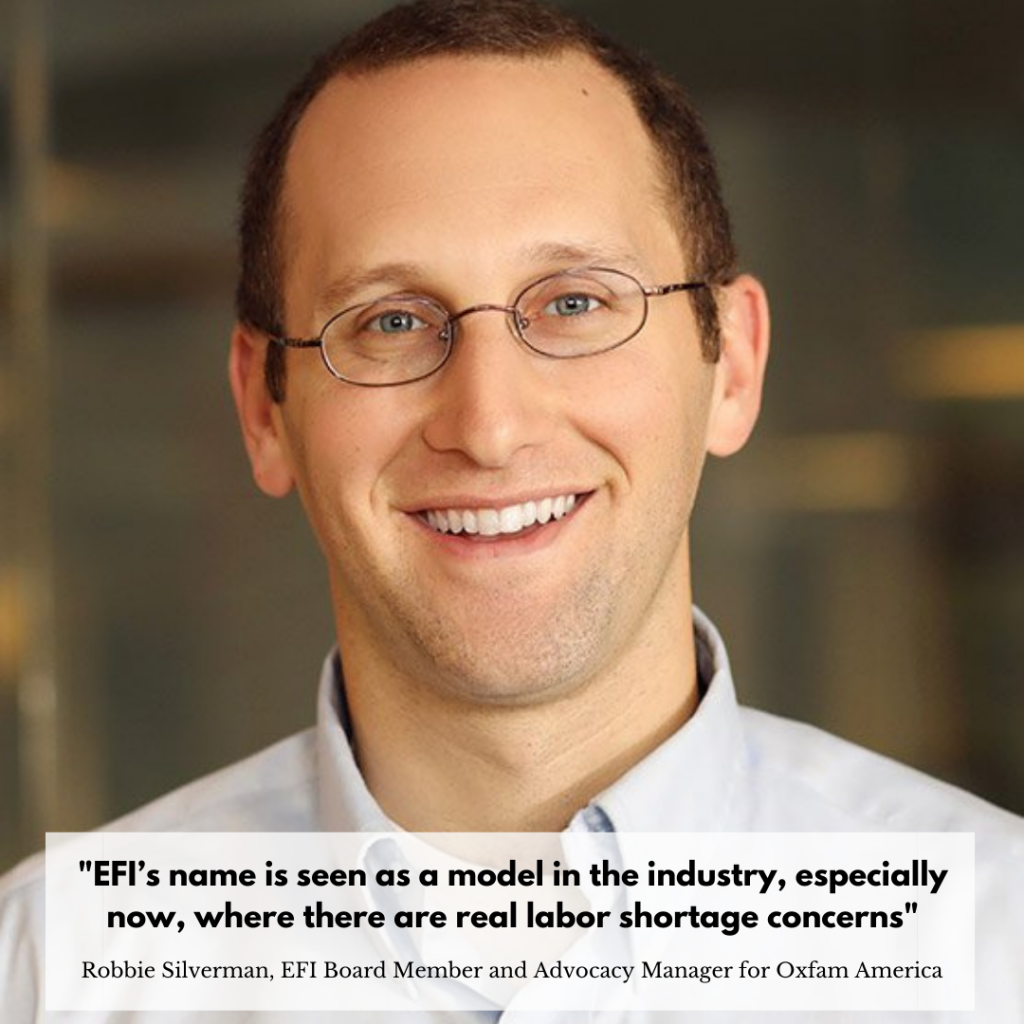
The People Behind EFI
In his role As Advocacy Manager at the global nonprofit Oxfam America, Robbie Silverman has worked on the launch of Equitable Food Initiative’s (EFI) certification label, participated in establishing an impact investment fund to boost women’s entrepreneurship in Guatemala, and led company engagement for a campaign against U.S. poultry processors over their treatment of employees. He is currently working to ensure that all COVID-19 vaccines and treatments are available to everyone.
We talked with Silverman about the importance of improving access to COVID-19 vaccines and improving farmworkers’ lives, as well as his role as a board member for EFI.
Q: What inspired you to choose a career path in private sector advocacy?
A: I have been interested in doing social justice work for as long as I can remember. My dad spent his career with the Environmental Protection Agency (EPA) and my mom was a women’s health advocate. She spent the last part of her career working at WIC to support women, infants, and children’s health. I grew up in a household with that ethos.
After college, I worked for a couple of different affordable housing organizations. I went into housing first because it is an essential need for everyone and second because it impacts so many other areas of people’s lives. Areas like public health, access to jobs and education, and environmental issues. Which made me interested in entering poverty issues more broadly. Then decided to pursue both a law and a business degree.
Q: What is Oxfam, and how does it tie in through the work of EFI?
A: Oxfam works on a vast number of issues. Our mission is to combat poverty and injustice throughout the world, encompassing an extensive range of issues and a massive range of geographies. The work feels very emergent and fresh. I’m constantly learning because we’re working on many different issues, and that appeals to me. And one thing that also appeals to me about Oxfam is that we do sort of the full spectrum of private sector influencing. This includes collaborating closely with companies on our anti-poverty mission and running harder-hitting campaigns that call out companies that don’t fulfill their responsibilities. EFI is an excellent example of bringing together different stakeholders to work together on a shared objective. I like the fact that we do work on the whole gamut and constantly try to innovate and think about new ways to make an impact.
Q: What is it about EFI’s work that you find most captivating?
A: It has been amazing to see how EFI has grown since incubating with Oxfam. Growers increasingly realize that investing in farmworkers to lift their skills prevents turnover and brings other benefits. It has been great to see how EFI is expanding geographically. We initially started just within the U.S. Now there are many EFI-certified farms throughout the Americas.
“I hope that people do use this moment to think about where our food comes from and the people that produce it”
– Robbie Silverman, EFI Board Member and Advocacy Manager for Oxfam America
Q: Why do you believe that equal access to COVID-19 vaccinations is so critical for essential workers like farmworkers?
A: Vaccines should be global public goods. Their availability should not be based on how much you can pay, it should be based on who’s most at risk and who is most in need. And that is, unfortunately, not the direction that we are headed. There’s a huge amount of inequity globally. People of color, indigenous populations, and frontline workers, including farmworkers, were the hardest hit in infection rates and often with higher morbidity rates.
Many folks either don’t have access to the vaccine or have reservations about taking the vaccine. That is very problematic because the new variants are more transmissible and deadly. We need to do a better job by ensuring that everybody has equal access to vaccines and by prioritizing the most vulnerable people.
Q: What can people do to assist farmworkers’ lives and working conditions?
A: Consumers should understand that an immense amount of human labor goes into producing the food we all eat. When people are becoming more intentional about the food that they purchase for their families, recognizing the human element behind that is essential. It is so important for shoppers to be concerned for the people who grow and harvest fresh produce. In some ways, the pandemic heightened those concerns that we weren’t just taking our food for granted or the cashier who rings us up after grocery shopping. We realized that these are frontline workers who are not often well-compensated and are continually working. Prioritizing their health and safety and having that extend not just at the retail level but throughout the food supply chain is essential. I hope that people do use this moment to think about where our food comes from and the people that produce it.
Written by: Tia Hill, Digital Media and Communications Intern, Equitable Food Initiative.
Related articles:
Entrepreneur and Board Vice-Chair Carol Schrader Reflects on EFI’s Impact

